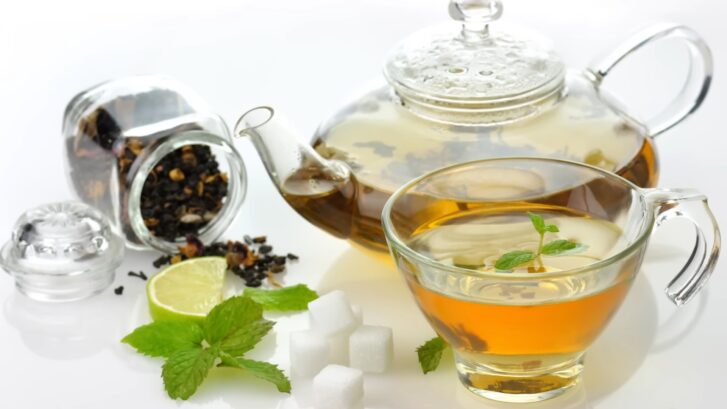As a beverage that combines both cultural allure and health benefits, rose tea is a unique and fragrant addition to any tea lover’s collection. Made from the petals and buds of the rose flower, this herbal beverage offers more than just a soothing aroma.
It is known for its high levels of antioxidants and vitamins, particularly Vitamin C, which contributes to various wellness benefits ranging from improved skin health to aiding digestion.
I’ve observed that rose tea is not only appreciated for its delicate flavor but also for its role in women’s health, providing relief from menstrual discomfort.
Alongside its health benefits, this beverage serves as a caffeine-free alternative to traditional teas, making it a perfect option for those seeking to lower their caffeine intake or simply wanting a calming drink at any time of day.
Key Takeaways
- Rose tea is rich in antioxidants and vitamins, promoting overall health.
- It has special benefits for women’s health, particularly in easing menstrual pain.
- Being caffeine-free, it’s a calming beverage suitable for consumption at any time.
Note: Mixing different teas like rose tea and Estafiate can boost your health and ease your menstrual cramps effectively.
Health Advantages
Rose tea offers a multitude of health benefits, ranging from providing essential vitamins to supporting the immune system.
Thanks to its rich composition of antioxidants and vitamins, I find it to be a great beverage choice for those looking for wellness benefits without caffeine.
| Aspect | Details |
|---|---|
| Nutritional Benefits | – Caffeine-free. – Hydrating. – Contains Vitamin C and A. – Essential minerals for health. – Good for skin and immune function. |
| Antioxidant Properties | – Rich in antioxidants like polyphenols, flavonoids, and phenolic acids. – Contains quercetin, kaempferol, anthocyanins, gallic acid, ellagic acid, and tannins. – Fights oxidative stress and may reduce chronic disease risk. |
| Influence on Immune System | – Antibacterial and anti-inflammatory. – Boosts immune defense with Vitamin C. – Phenolic compounds reduce inflammation. – Antimicrobial effects help fight infections. |
Rose Tea as a Wellness Beverage
1. Stress and Anxiety Reduction
My research indicates that rose tea is an excellent drink for soothing nerves and helping to alleviate the tension associated with stress and anxiety.
It contains compounds that may have a calming effect on the central nervous system, potentially offering a sense of relaxation.
2. Sleep Enhancement
For those that have problems with sleeping, this beverage can be very beneficial. The absence of caffeine and the presence of calming components can assist in creating a conducive state for rest, making it easier to fall and stay asleep.
3. Skin and Hair Health
This tea also holds properties that are advantageous for skin and hair. Its antioxidants and anti-inflammatory characteristics can contribute to the overall health of the skin, while also potentially improving the strength and vitality of hair.
4. Digestive Health
Renowned for its digestive benefits, rose tea can play a role in maintaining a balanced microflora in the gut. I consider its antibacterial properties and positive influence on digestion, contributing to an overall state of wellness and comfort.
Benefits for Women’s Health
Rose tea is celebrated for its potential health benefits for women, specifically supporting experiences distinct to female physiology. I’ll discuss two of its purported benefits: aiding with menstrual pain relief and minimizing menopausal symptoms.
- Menstrual Pain Relief: During menstruation, I often seek natural ways to alleviate discomfort. Rose tea is commonly recommended for its ability to ease menstrual pain. The relief of dysmenorrhea, which refers to the pain associated with menstruation, may be supported by the anti-inflammatory properties of rose tea. Women who consume this beverage have reported reduced severity of menstrual cramps.
- Minimizing Menopausal Symptoms: Menopause can come with a host of challenging symptoms, ranging from mood swings to hot flashes. I find that including rose tea in my routine might serve as a complementary approach to minimizing these symptoms. Its calming properties might contribute to reducing irritability and improving sleep quality, two common menopausal challenges.
Anti-inflammatory and Antibacterial Benefits
Rose tea’s ability to combat inflammation and act as an antimicrobial agent is notable. Studies suggest that its high vitamin content, particularly that of Vitamin C, contributes to the reduction of inflammation—a common culprit in a range of health issues.
The antimicrobial effects of this beverage are important in fending off pathogens and supporting immune system function, offering a promising natural remedy against bacterial infections.
1. Chronic Disease Management
The anti-inflammatory properties of rose tea also make it an ally in managing chronic diseases. Persistent inflammation is a known contributor to chronic conditions, and the reduction of inflammation may help manage symptoms and improve overall well-being.
Additionally, rose tea’s antioxidants are crucial for combating oxidative stress, which is linked to the development of numerous chronic diseases.
2. Heart and Joint Health
Consuming rose tea may contribute positively to heart health due to its potential to enhance blood circulation and reduce blood pressure.
Furthermore, I’ve learned that the anti-arthritic properties of this beverage might be beneficial for individuals suffering from arthritis pain.
Regular consumption may help in maintaining joint health and managing arthritis-related symptoms, providing a layer of support for those affected by joint conditions.
Integrative Care
Weight Management and Exercise
I’ve learned that rose tea may be a helpful ally in weight management, particularly as a low-calorie beverage that supports hydration. Proper hydration is critical for optimal metabolism and exercise performance.
Additionally, rose tea’s potential diuretic effect can reduce water weight, contributing to the overall weight loss process.
Mental Well-being and Mood Stabilization
When it comes to mental well-being, this herbal infusion can play a role in mood stabilization. Consuming this beverage has been associated with a reduction in stress and a calming effect, which can alleviate feelings of fatigue and depression.
Its aroma alone is noted for its relaxation properties, which can complement traditional therapies for mood disorders.
The presence of antioxidants suggests a benefit to overall mental clarity and brain health, though I always recommend consulting with a healthcare provider to address any serious mental health concerns.
Additional Therapeutic Uses
Pain and Recovery
- Pain Relief: I find rose tea particularly effective in alleviating discomfort. It acts as a gentle analgesic, which makes it a suitable choice during times of recovery, especially after minor physical strains. Individuals have used it to ease menstrual cramps, relying on its soothing properties to reduce pain intensity.
- Healing: Marrying hydration with its therapeutic effects, rose tea fortifies the body’s healing processes. Its constituents have been known to contribute to faster recovery, providing a sense of relief and comfort.
Liver and Kidney Support
- Liver Function: It’s believed that this beverage helps reduce oxidative stress, thanks to its antioxidants. By doing so, it may contribute to improved liver health, potentially aiding those with liver concerns.
- Bile Production: A well-functioning liver also means efficient bile production. The detoxifying effects of rose tea are noteworthy as they support the liver in producing bile, which in turn, aids in digestion and sustenance of metabolic processes.
- Kidney Health: This beverage benefits the kidneys as well. It acts as a natural diuretic, which helps in flushing out toxins, reducing the burden on these crucial filtering organs. This is particularly beneficial in preventing and fighting urinary tract infections.
How to Prepare It?
Choosing the right method for preparing rose tea ensures the best flavor and maximizes the potential benefits.
Brewing Techniques
| Step | Instructions |
|---|---|
| 1 | Clean the teapot to avoid altering the tea’s flavor. |
| 2 | Measure 1 to 2 teaspoons of dried rose petals or rose buds per cup. |
| 3 | Pour boiling water over the petals in the teapot. |
| 4 | Let them infuse for 5 to 10 minutes, depending on the desired strength. |
| 5 | Look for a pink hue and a subtle floral aroma in the resulting liquid. |
Serving Suggestions
After brewing, I like to serve rose tea in a transparent cup to appreciate its beauty. For sweetening, adding a bit of honey complements the tea’s natural flavors and adds a smooth finish without overpowering the rose notes.
On cooler days, serving this beverage hot is comforting, while in summer, it makes a refreshing iced beverage. Occasionally, mixing it with other herbal teas can create delightful flavor combinations.
Comparison with Other Teas
When comparing rose tea with other tea varieties, I focus on two main comparisons: Green tea, known for its high antioxidant content, and the broad category of herbal teas, each with their unique benefits.
| Tea Variety | Main Characteristics | Health Benefits | Caffeine Content | Aroma |
|---|---|---|---|---|
| Green Tea | Rich in antioxidants, especially catechins like EGCG | Supports heart health, aids in weight management | Contains caffeine, but less than black tea | Fresh, grassy |
| Rose Tea | Naturally caffeine-free, floral flavor | Soothing, may contribute to hydration and weight loss | Caffeine-free | Gentle, floral |
| Hibiscus Tea | Tangy and sweet, rich in antioxidants | Lowers blood pressure and cholesterol, promotes weight loss, fights inflammation and bacteria, supports liver health | Usually caffeine-free | Tart, fruity |
| Rooibos (Red Tea) | High in antioxidants | Improves heart health, skin health, anti-inflammatory | Caffeine-free | Warm, nutty, slightly sweet |
| Rosehip Tea | High in vitamin C and flavonoids | Boosts immune system, supports skin health, anti-inflammatory | Usually caffeine-free | Tangy, fruity, slightly floral |
Are There Any Side Effects?
While I enjoy this beverage very much, it’s important for readers to be aware of its potential downsides. Side effects are relatively rare and usually not severe, but they can occur, and it’s crucial to know when to seek medical advice.
Certain individuals may also experience allergic reactions, varying in intensity from mild to serious. Now, let’s explore the specifics.
- I’ve found that some side effects of rose tea can include nausea and headaches, although these are quite uncommon. If you’re new to rose tea and you notice any symptoms that cause discomfort, such as persistent nausea or headaches, it’s wise to stop consumption and consult a healthcare provider.
- Additionally, there’s a possibility of vomiting or formation of kidney stones, especially if consumed in excessive amounts due to the high concentration of oxalates in rose tea.
Pay Attention to Allergies
If you have a history of allergies, especially to plants, it’s crucial to be cautious.
Symptoms of an allergic reaction might include skin rashes, itching, or respiratory issues. In my case, I pay close attention to any signs of an allergic reactions like swelling of the lips, tongue, or throat, which necessitates immediate medical attention.
Always start with a small amount to test your tolerance.
FAQs
Can rose tea interact with certain medications?
While this beverage is generally safe, it can interact with some medications. Consult a healthcare provider if you’re on medication, especially those affected by high vitamin C intake.
Is rose tea safe for pregnant or breastfeeding women?
Pregnant or breastfeeding women should consult a healthcare provider before adding this beverage to their diet due to its potential effects on hormone levels.
How does rose tea compare to green tea in terms of antioxidant levels?
While both are rich in antioxidants, green tea contains catechins like EGCG, whereas rose tea is high in polyphenols and vitamin C, offering different antioxidant profiles.
Can rose tea be used topically for skin benefits?
With its anti-inflammatory and antioxidant properties, this beverage can be used topically as a facial rinse or in skincare routines, potentially benefiting skin health.
Is rose tea effective in detoxifying the body?
Its diuretic properties and antioxidants may assist in detoxification, but it should be part of a balanced diet and not relied upon as a sole detoxifying agent.
Summary
To sum up, rose tea is a versatile and aromatic beverage offering a range of health benefits. From its rich antioxidant content to its soothing properties, it’s particularly noted for its positive impact on women’s health, digestive wellness, and stress reduction.
Being caffeine-free, this beverage is suitable for any time of the day, making it a great choice for those seeking relaxation and healthful perks.




















